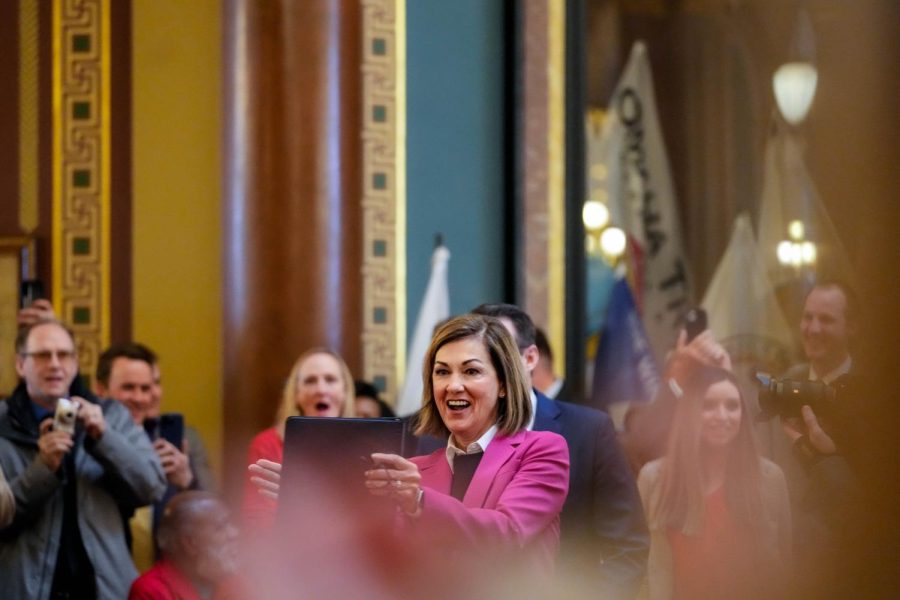Reynolds signed her $345 million school choice bill into law Tuesday morning
After more than eight hours of debate late Monday night and early Tuesday morning the Iowa House and Senate passed the ‘Students First Act’, Gov. Reynolds’ largest legislative priority. Reynolds signed the bill into law on Tuesday morning.
Margaret Kispert/The Register / USA TODAY NETWORK
Gov. Kim Reynolds walks into the Iowa State Capitol rotunda to sign the House File 68 on Tuesday, Jan. 24, 2023.
January 24, 2023
Students in Iowa attending private schools will now receive $7,600 in state tax dollars after Gov. Kim Reynolds signed the Students First Act, her largest legislative priority, Tuesday.
The state-funded program will allocate the current amount of state supplemental funding for public school students. The money can be used by private school students to pay for tuition, tutoring, and school supplies.
The hotly debated legislation passed a vote in the Iowa House late Monday evening 55-45. All Democrats opposed and nine Republicans joined in the opposition. The Senate took up the House version of the school choice legislation after it passed the House. In a Senate vote, it passed 33-18. All 16 Senate Democrats were opposed, three Republicans joined in voting against the bill, and one Democrat was absent for the vote.
Reynolds celebrated the vote Tuesday morning in a signing ceremony and released a statement early Tuesday morning after the bill passed votes in both chambers.
“For the first time, we will fund students instead of a system — a decisive step in ensuring that every child in Iowa can receive the best education possible,” Reynolds said in the news release. “With this bill, Iowa has affirmed that educational freedom belongs to all, not just those who can afford it.”
A dozen Republican lawmakers join Democrats in opposition to the bill
Tom Moore, a Republican from Griswold, told reporters late Monday evening after the House finished a vote on the bill that he voted against the bill because his constituents didn’t like the program.
“I don’t represent myself — although I was opposed to the bill — I don’t represent myself, I represent them, and that’s where my vote was,” Moore said.
Moore also said his concerns with the legislation were rooted in the lack of income limits on the bill, which gives tax-dollars to families who could already afford a choice in education.
“To me, being a fiscal conservative to give 33,000 people new money that they have already been spending on their own and don’t really need. To me that’s money that we could be using for other purposes here at the Capitol,” Moore said.
House Minority Leader Jennifer Konfrst, D-Windsor Heights, said private schools’ selective admission processes don’t give some public school students a choice in education, specifically children with disabilities.
“Public schools accept all kids. Private schools pick-and-choose,” Konfrst said. “This is not about school choice; this is about school administrator choice.”
Law estimated to cost $345 million annually
For the next budget year, starting July 1, the program is estimated to cost $107 million in state funds. The law is designed to be phased into Iowa’s budget over 3 years. In the first year, current public school students, all kindergarten students, and private school families that make less than 300 percent of the federal poverty level will be eligible.
Once fully implemented all of Iowa’s nonpublic schools, K-12 students would be eligible to receive the accounts, no matter their income level, and it is estimated to cost $345 million annually.
The law does designate residual money that will stay with the student’s home district specifically designated for teacher salaries and professional development costs. The $1,200 would also be given to the school districts of current private school students who apply for the accounts.




